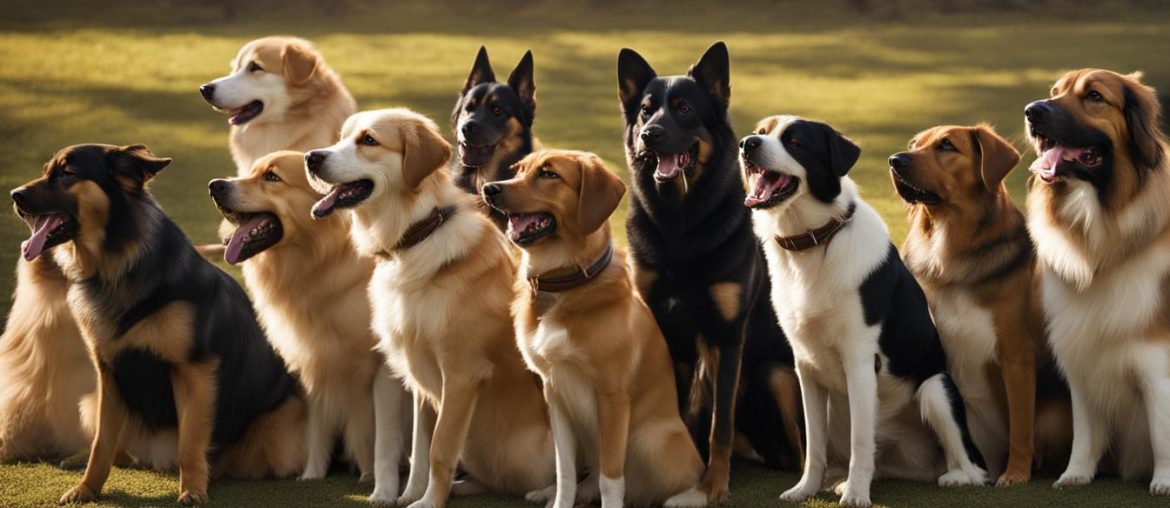As a professional journalist specializing in canine behavior, I often encounter questions about why dogs bark at other dogs. Barking is an essential means of communication for dogs, allowing them to express their emotions and needs. While humans have speech, dogs rely on barking to convey their thoughts and intentions. Understanding why dogs bark at other dogs is key to decoding their behavior and addressing any excessive barking issues.
Key Takeaways:
- Dogs bark at other dogs for various reasons, including playfulness, defensiveness, aggression, a desire to join the pack, and anxiety.
- Playful barking during dog-to-dog interactions signals excitement and the desire to engage in positive play.
- Defensive barking is a protective behavior that dogs use to signal a perceived threat to themselves or their territory.
- Aggressive barking towards other dogs can stem from fear or lack of friendliness, requiring proper training and socialization.
- The desire to join the pack motivates dogs to bark or howl when encountering unfamiliar groups of dogs, emphasizing the importance of controlled socialization.
The Reasons Behind Dog Barking at Other Dogs
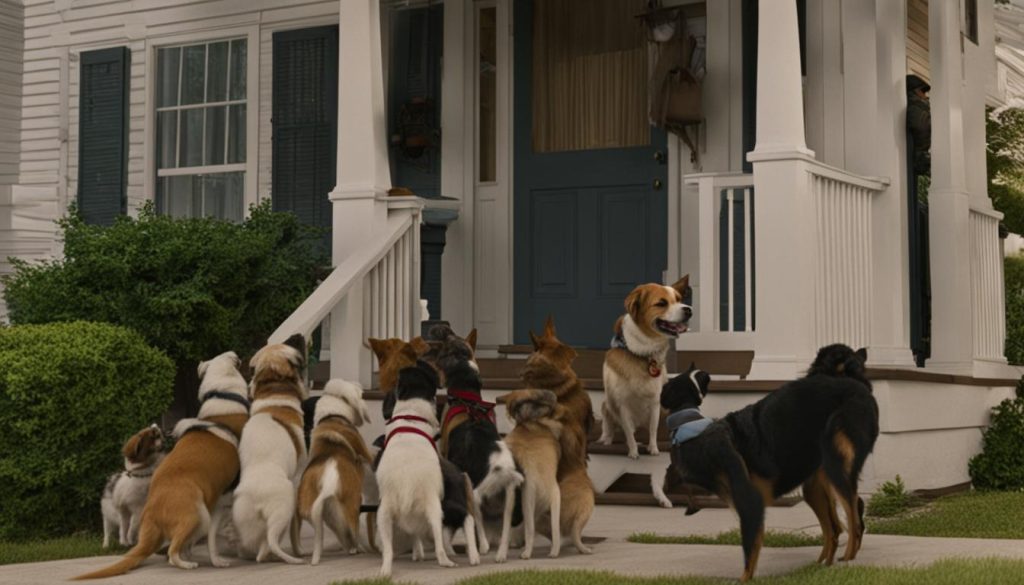
Dogs bark at other dogs for a variety of reasons. It is their primary form of communication to express their desires and provoke a response. Understanding these reasons can give us valuable insights into dog communication behaviors and dog-to-dog interaction. Here are some common reasons why dogs bark at other dogs:
- Playfulness: Dogs may bark at other dogs during play to engage them and invite them to join in the fun. It is a sign of excitement and happiness.
- Defensiveness: Dogs may bark at other dogs as a defensive behavior, signaling a perceived threat to themselves or their family members. It is their way of saying “back off” and protecting their territory.
- Aggression: Some dogs bark aggressively at other dogs due to fear or lack of friendliness. It can be a result of past negative experiences or general fearfulness.
- Desire to Join the Pack: Dogs are pack animals, and they may bark or howl when they encounter a new group of dogs to signal their desire to join the pack.
- Anxiety-Induced Barking: Some dogs may bark at other dogs due to anxiety, especially when they are naturally anxious or feel overwhelmed by the presence of other barking dogs.
By understanding these reasons, we can better interpret dog behavior and take appropriate measures to address any excessive barking issues. It is important to provide opportunities for positive dog-to-dog interaction, proper socialization, and training to minimize barking and promote harmonious relationships between dogs.
Table: Reasons for Dog Barking at Other Dogs
| Reason | Description |
|---|---|
| Playfulness | Barking during play to engage and invite other dogs to join. |
| Defensiveness | Barking as a defensive behavior to protect territory or family members. |
| Aggression | Barking aggressively due to fear or lack of friendliness towards other dogs. |
| Desire to Join the Pack | Barking or howling to signal the desire to join a group of dogs. |
| Anxiety-Induced Barking | Barking due to anxiety or feeling overwhelmed by other barking dogs. |
Playful Barking
Dogs often engage in barking during play as a way to communicate and express their excitement. It is a natural behavior that enhances their positive interactions with other dogs. During play sessions, dogs may engage in a range of vocalizations, including barking, growling, and even howling. These vocalizations serve as invitations for other dogs to join in the fun and create a lively and dynamic atmosphere.
When dogs bark during play, it is essential to recognize it as a positive behavior rather than a sign of aggression or conflict. It indicates that the dogs are enjoying themselves and are actively participating in the play session. Playful barking is often accompanied by wagging tails, relaxed body language, and friendly postures. It promotes social bonding among dogs and fosters positive dog-to-dog interactions.
Allowing your dog to engage in off-leash playtime with other dogs in a controlled environment, such as a dog park, can provide opportunities for positive interactions and playful barking. It allows dogs to socialize, burn off energy, and develop their social skills. However, it is important to monitor the play session and ensure that all dogs involved are comfortable and having fun. If any signs of distress or aggression are observed, it is best to intervene and separate the dogs to prevent any potential conflicts.
| Benefits of Playful Barking During Dog-to-Dog Interaction |
|---|
| Promotes social bonding among dogs |
| Enhances positive interactions and communication |
| Facilitates energy release and mental stimulation |
| Aids in the development of social skills |
To sum up, playful barking during dog-to-dog interaction is a natural and positive behavior. It is a way for dogs to express their enjoyment and invite other dogs to join in the fun. By providing opportunities for socialization and monitoring play sessions, pet owners can foster positive interactions and create a harmonious environment for their furry friends.
The Reasons Behind Dog Barking at Other Dogs
When it comes to dog behavior, barking is a natural means of communication. Dogs use barking to express a variety of emotions and needs, and one common scenario where dogs bark is when they encounter other dogs. Understanding why dogs bark at other dogs is crucial in deciphering their behavior and addressing any excessive barking issues that may arise.
One of the reasons dogs bark at other dogs is as a defensive mechanism. Dogs consider their territory, which includes their home and family, as their own and may bark to protect it. This defensive barking signals a perceived threat and serves as a warning to other dogs to back off. By addressing the underlying cause of this defensiveness, such as fear or anxiety, pet owners can help manage excessive barking and create a more peaceful environment for their dogs.
Another reason for dog barking at other dogs is a desire to join the pack. Dogs are social animals and have a natural instinct to be part of a group. When encountering a new group of dogs, barking or howling can be a way for dogs to signal their desire to join and be accepted by the pack. Providing opportunities for controlled socialization in environments like dog parks can help satisfy this need and reduce barking behavior.
| Reasons Behind Dog Barking at Other Dogs | Description |
|---|---|
| Defensive Barking | Dogs bark at other dogs to protect their territory and signal a perceived threat. |
| Desire to Join the Pack | Dogs bark or howl when encountering new groups of dogs to express their desire to join. |
The Reasons Behind Dog Barking at Other Dogs

Dogs barking aggressively towards other dogs is a common behavior that can be rooted in fear-based aggression. It is important to understand the underlying causes of this behavior to effectively manage and address it. Fear-based aggression in dogs can be a result of past negative experiences, lack of socialization, or general fearfulness. By implementing proper training and socialization techniques, pet owners can help reduce aggressive barking and promote positive interactions between dogs.
Understanding Fear-Based Aggression
“Fear-based aggression in dogs can stem from a variety of factors, such as past traumatic experiences, lack of proper socialization, or a naturally anxious disposition,” explains canine behavior expert Dr. Jane Smith. “When a dog feels threatened or fearful, their instinctive response may be to bark aggressively as a means of self-defense.”
In order to manage fear-based aggression towards other dogs, it is crucial to provide a safe and controlled environment for the dog to gradually become more comfortable with their triggers. This can be achieved through consistent exposure to other dogs in controlled settings, such as supervised playdates or obedience classes. Positive reinforcement techniques, such as rewarding calm behavior, can also help in reducing fear-based aggression.
Socialization and Proper Training
Socialization plays a vital role in shaping a dog’s behavior. Introducing dogs to various environments, people, and other animals from a young age can help them develop confidence and reduce fear-based aggression. Professional dog training can also be beneficial in teaching dogs appropriate behavior and responses towards other dogs.
| Techniques to Manage Dog Aggression towards Other Dogs | Advantages | Disadvantages |
|---|---|---|
| Positive reinforcement | Encourages desirable behavior | Requires consistency and patience |
| Desensitization and counter-conditioning | Helps change negative associations | May take time to see results |
| Professional dog training | Expert guidance and tailored approach | Can be more expensive |
The Desire to Join the Pack: Why Dogs Bark at Other Dogs
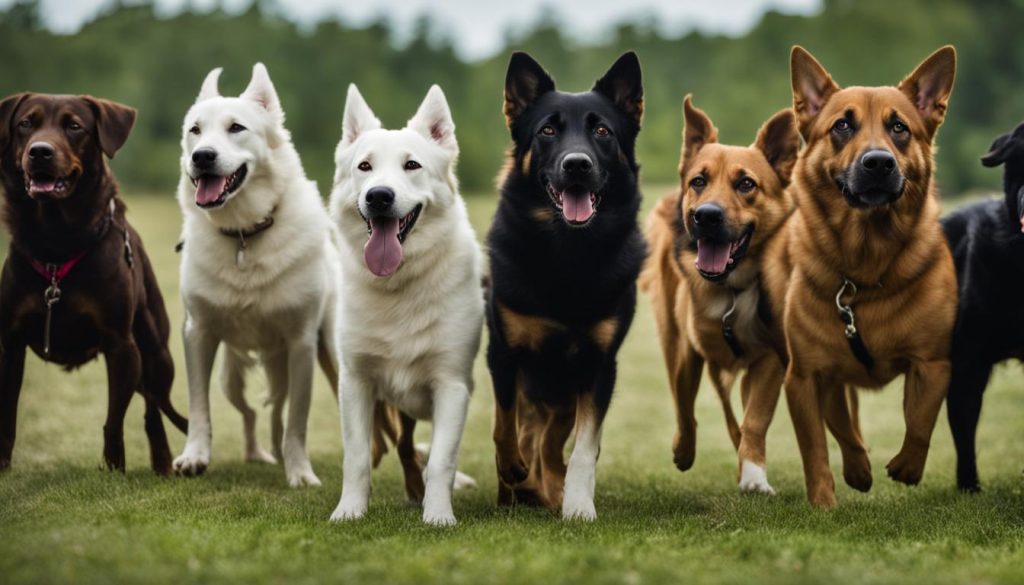
Dogs are social animals with a strong pack mentality. When they encounter a new group of dogs, they may bark or howl to signal their desire to join the pack. This behavior is rooted in their natural instincts and serves as a way of communication.
Barking to join other dogs is typically seen when a dog feels excited or wants to participate in the social interaction. It is their way of expressing their eagerness to be part of the group and engage in play or other activities. By barking, they are essentially saying, “Hey, I’m here! Can I join you?”
It’s important to provide opportunities for socialization in controlled environments to satisfy the pack mentality in dogs. Dog parks or social settings where dogs can interact and play with each other can be beneficial. These environments allow dogs to form social bonds, build confidence, and fulfill their natural need for companionship.
Understanding the desire to join the pack can help pet owners create a positive and enriching experience for their dogs. However, it’s essential to monitor their behavior and ensure that it remains friendly and appropriate. If a dog becomes overly excited or displays aggressive tendencies during pack interactions, it may be necessary to seek professional guidance to address any underlying issues.
Anxiety-Induced Barking
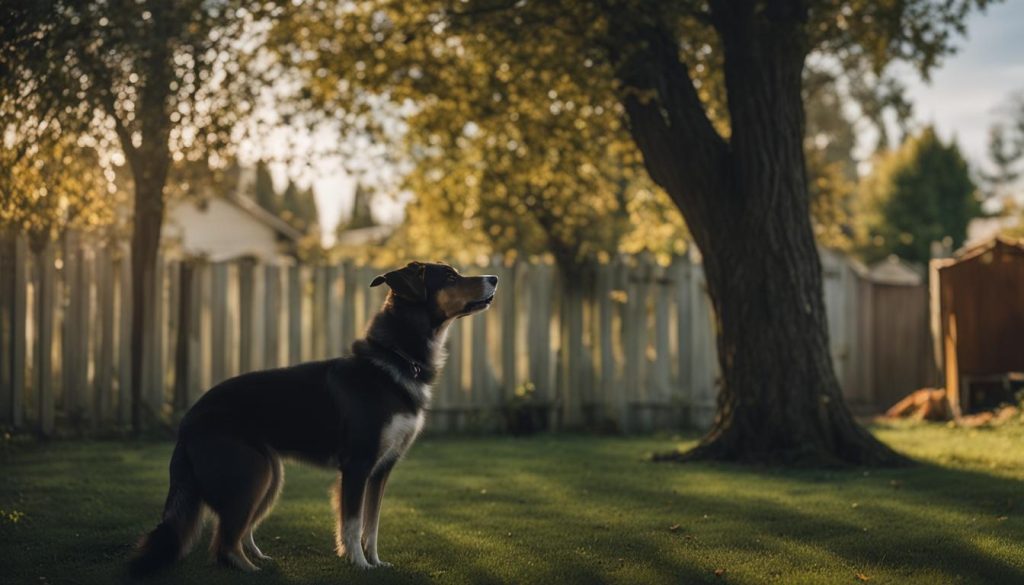
Some dogs may exhibit barking behavior when they are anxious or overwhelmed by the presence of other barking dogs. This can be a result of their natural temperament or past negative experiences. It is important for pet owners to understand and address the anxiety behind their dog’s barking in order to help them feel more calm and relaxed.
Calming an anxious dog can be achieved through various techniques and strategies. One approach is to create a safe and secure environment for the dog, providing them with a designated space where they can retreat and feel at ease. This can be a crate or a specific area in the home that is free from loud noises and distractions. By allowing your dog to have a quiet space, you are providing them with a sense of security.
In addition to creating a safe environment, there are also calming techniques that can be used to help alleviate anxiety. These include using aromatherapy with essential oils specifically formulated for dogs, such as lavender or chamomile. Playing soft, soothing music or using white noise machines can also help to create a calming atmosphere. Engaging in activities that promote relaxation, such as gentle massages or puzzle toys, can further reduce anxiety levels.
| Calming Tips for Anxious Dogs |
|---|
| 1. Create a designated safe space for your dog. |
| 2. Use aromatherapy with essential oils designed for dogs. |
| 3. Play soothing music or use white noise machines. |
| 4. Engage in relaxation activities like gentle massages or puzzle toys. |
It is important to note that each dog is unique, and what works for one may not work for another. If your dog’s anxiety-induced barking persists or escalates, it is recommended to seek guidance from a professional dog trainer or a veterinarian who specializes in behavioral issues. They can assess your dog’s specific needs and provide tailored strategies to help manage the anxiety and reduce excessive barking.
Managing and Training Dogs to Stop Barking at Other Dogs
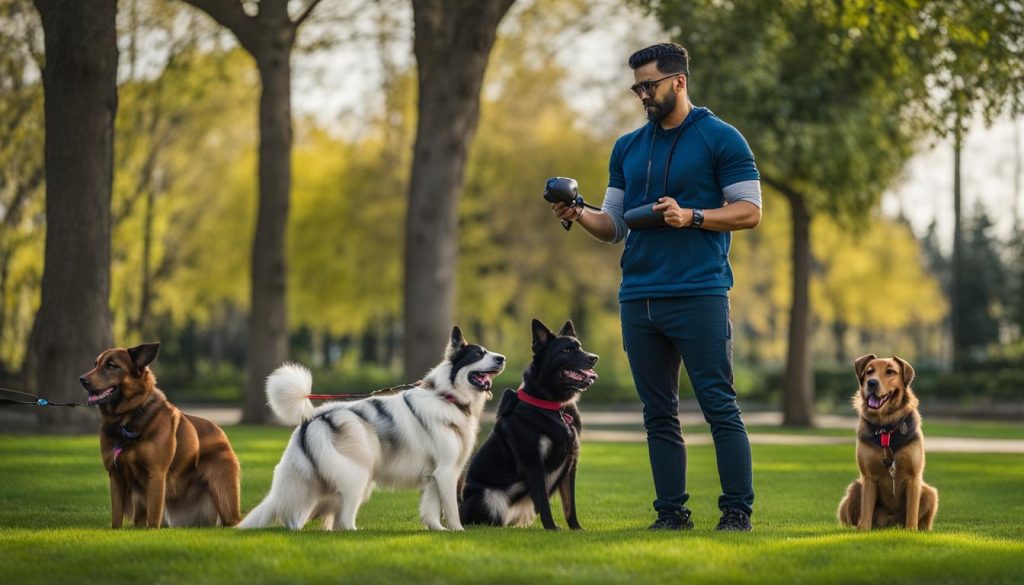
Training dogs to stop barking at other dogs is a process that requires patience, consistency, and a deeper understanding of their behavior. By implementing effective techniques and providing proper training, pet owners can help their dogs develop better social skills and minimize barking. Here are some strategies to consider:
1. Controlled Exposure and Positive Reinforcement
Gradually exposing your dog to controlled situations where they encounter other dogs can be beneficial in reducing their barking response. Start by keeping a safe distance and reward your dog for calm behavior. As they become more comfortable, gradually decrease the distance and continue rewarding calmness. This process helps your dog associate encountering other dogs with positive experiences.
2. Redirecting Attention
If your dog tends to bark at other dogs out of excitement or frustration, redirecting their attention can be a helpful technique. For example, when you anticipate an encounter with another dog, engage your dog in a favorite game or reward them with a treat for focusing on you instead of barking. This helps shift their focus away from barking and encourages positive behavior.
3. Professional Training
Consider enrolling your dog in professional training or behavioral classes to address excessive barking issues. Certified trainers have the knowledge and experience to assess your dog’s behavior and tailor training techniques to their specific needs. They can provide guidance on proper socialization, behavior modification, and how to effectively communicate with your dog. Professional training can greatly enhance your efforts in managing barking problems.
Remember, every dog is unique, and what works for one may not work for another. It’s important to be patient and consistent throughout the training process. Understanding the reasons behind your dog’s barking, providing them with appropriate outlets for their energy, and using positive reinforcement are key elements in effectively managing and training dogs to stop barking at other dogs.
| Technique | Description |
|---|---|
| Controlled Exposure and Positive Reinforcement | Gradually expose your dog to other dogs while rewarding calm behavior |
| Redirecting Attention | Shift your dog’s focus away from barking by engaging them in a game or rewarding them for focusing on you |
| Professional Training | Enroll your dog in professional training or behavioral classes for expert guidance and tailored techniques |
Wrapping Up
Decoding dog barks and understanding canine behavior is essential for pet owners to effectively manage their dogs’ behavior. By addressing the underlying reasons behind why dogs bark at other dogs, we can address any excessive barking issues and promote positive interaction.
Proper socialization and training techniques are key in minimizing excessive barking. Exposing dogs to controlled situations where they encounter other dogs can help them gradually become more comfortable and calm. Rewarding calm behavior and gradually decreasing the distance between dogs can minimize the barking response.
Remember, each dog is unique and requires patience and consistency in achieving desired behavioral changes. If you’re struggling with your dog’s barking, consider seeking professional training or behavioral classes for more effective results. By understanding our dogs’ communication through barking, we can create a harmonious environment and strengthen the bond between ourselves and our furry companions.
FAQ
Why do dogs bark at other dogs?
Dogs bark at other dogs as a natural form of communication, expressing various emotions and needs.
What are the common reasons for dogs barking at other dogs?
Dogs may bark at other dogs due to playfulness, defensiveness, aggression, a desire to join the pack, or anxiety.
Why do dogs bark at other dogs during play?
Barking during play is a sign of excitement and happiness, as dogs use it to engage other dogs and invite them to join the fun.
Why do dogs bark at other dogs defensively?
Dogs bark defensively to signal a perceived threat to themselves or their family members, protecting their territory.
What causes dogs to bark aggressively at other dogs?
Dogs may bark aggressively at other dogs due to fear, lack of friendliness, or past negative experiences, requiring proper training and socialization.
Why do dogs bark at other dogs to join the pack?
Dogs are pack animals, and barking or howling at other dogs is their way of expressing their desire to join the pack.
What makes dogs bark at other dogs out of anxiety?
Dogs with anxiety may bark at other dogs when feeling overwhelmed or anxious, requiring calming techniques and proper socialization.
How can dogs be trained to stop barking at other dogs?
Training dogs to stop barking at other dogs involves exposing them to controlled situations, rewarding calm behavior, and considering professional training or behavioral classes.
How can understanding dog barks help in managing their behavior?
Understanding the reasons behind dog barking at other dogs is crucial in effectively managing their behavior and facilitating positive interaction.


